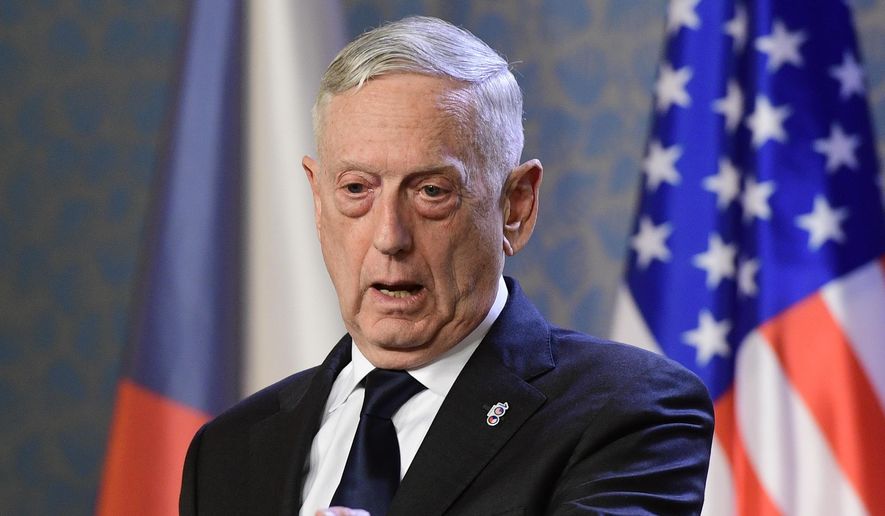Defense Secretary James N. Mattis on Tuesday voiced his implicit support for a so-called “Arab NATO” that would include the small, oil-rich nation of Qatar, despite Doha’s ongoing diplomatic conflicts with Saudi Arabia and its Middle East allies.
“The U.S. supports an inclusive, strategic Mideast alliance … one that brings together all partners to address shared challenges,” the former four-star general said, standing alongside Qatari Defense Minister Khalid Al-Attiyah at the Pentagon Tuesday.
“Washington remains committed to working by, with and through partners in the region to make this concept a reality, and to deter hostile actors,” Mr. Mattis added in prepared remarks to reporters, ahead of bilateral meetings with the Qatari defense chief.
While both men, did not mention the idea of an Arab NATO by name, such a partnership would only build upon the ’historically strategic partnership based on mutual respect” between Washington and Doha, Mr. Attiyah said during his remarks ahead of Tuesday’s meeting.
During the press conference, Mr. Mattis cited Qatar’s continued military support for the U.S. and NATO mission in Afghanistan as proof that Doha’s participation in an Arab NATO construct would be in the best interests of Washington and its allies.
“In Qatar, we recognize a long time friend, a military partner for peace and stability in the Middle East and a supporter of NATO’s mission in Afghanistan,” Mr. Mattis said, adding “I look forward to [Mr. Attiyah’s] insights on how we can advance that security” in the region.
American diplomatic efforts to spearhead an Arab NATO-type organization, known within the administration as “Middle East Strategic Alliance,” or MESA, gained traction last month during the United Nations General Assembly meeting in New York.
There, Secretary of State Mike Pompeo met with officials from Bahrain, Egypt, Jordan, Kuwait, Oman, Qatar, Saudi Arabia, and the United Arab Emirates to lay the groundwork for a possible January summit to explore the possibility of MESA.
The organization envisioned would be a military coalition led by Riyadh and include the six Arab states of the Gulf Cooperation Council (GCC) along with Egypt and Jordan.
But the ongoing Saudi Arabia-led embargo of Qatar has created serious complications for the idea of an Arab NATO. Riyadh and its allies have successfully cornered Qatar, diplomatically and economically, for over a year over allegations of the country’s sponsorship of terrorism.
Qatar is a majority-Sunni Arab nation like the UAE, Saudi Arabia and Egypt, but has long kept up ties to Shiite Iran, upon which Doha’s energy wealth is dependent. It has also preserved relations with the Muslim Brotherhood, the Islamist movement that was ousted by current Egyptian President Abdel-Fatah el-Sissi in a 2013 military coup.
But with Riyadh now reeling from accusations Crown Prince Mohammad Bin Salman played a direct role in facilitating the death of journalist Jamal Khashoggi, — who has not been seen since entering the Saudi consulate in Istanbul on Oct. 2 — Washington could leverage that international pressure into Saudi concessions on the Qatari blockade.
On Tuesday, Mr. Attiyah declined to comment whether Saudi Arabia’s involvement in Mr. Khashoggi’s death could have any impact on ending the Qatari embargo.
However, given the loyalties to the White House by GOP rank and file members in both chambers, and Mr. Trump’s seeming unwillingness to push back against Riyadh, there is little Washington can realistically do to force the administration’s hand on Qatar.
But earlier this week, the Pentagon announced it would be withdrawing military logistical support for the Saudi-led war in Yemen, ending refueling operations for Riyadh’s bombers and fighters responsible for massive airstrikes across the country. Regional experts and military analysts say the decision resulted from the ongoing international fallout from the Mr. Khashoggi affair.
• Carlo Muñoz can be reached at cmunoz@washingtontimes.com.




Please read our comment policy before commenting.